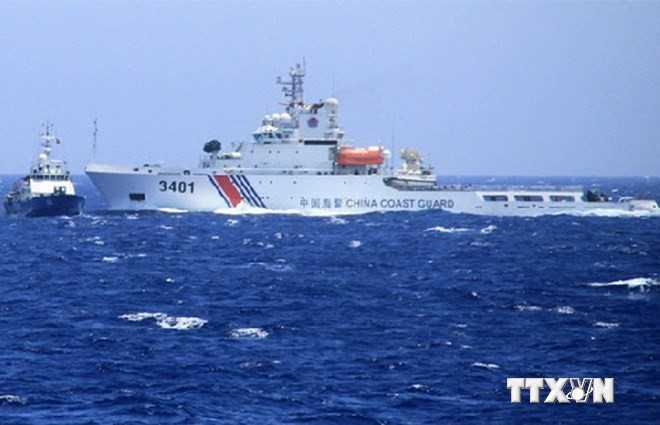"If China is aggressive, businesses and people will suffer"
Belgian newspaper Le Soir recently published an article commenting on China's actions in the East Sea with the title "China's display of power upsets the regional balance."
 |
| Chinese ships prevent Vietnamese law enforcement vessels from exercising sovereignty in the East Sea (Source: VNA) |
According to the article, China pressured organizers of the annual Shangri-La Dialogue in Singapore last weekend by sending Fu Ying, chairwoman of the National People's Congress's Foreign Affairs Committee, who is known for her tough stance but clever way of speaking.
China's placement of the Haiyang Shiyou-981 oil rig in Vietnam's exclusive economic zone in the East Sea in early May sparked a wave of protests by Vietnamese people at home and abroad against the Chinese government. The Paracel Islands are rich in oil, so China plans to permanently place the rig there without waiting for the dispute to be resolved.
To protect the rig, Chinese ships attacked Vietnamese ships, spraying them with water cannons. This escalation of violence by China against Vietnam is similar to what it did to a Philippine military vessel in early March when it was in the area of the Paracel Islands. This action by China prompted the Philippines to file a lawsuit with the International Court of Justice in The Hague demanding that China respect its sovereignty.
For its part, China believes its power is irreplaceable. Murray Hiebert, a former reporter for the Far Eastern Review, said that in 2015, the Association of Southeast Asian Nations (ASEAN) will establish a Common Economic Community in which trade with China will play an important role. Beijing is the largest aid provider to Laos and Cambodia.
The article quoted author Robert Kaplan writing in the book "Asian Cauldron" saying: "The South China Sea is the key to trade and growth. If there is instability here, the whole world will lose." For countries that share the sea with China, they suffer indirect consequences from close relations with China. Beijing sends many tourist groups and much aid to its neighbors, but its companies only target these countries' resources.
In Thailand, when the Chinese movie "Lost in Thailand" made a big splash in 2013, the appearance of too many passenger cars and buses with Chinese license plates also made people uncomfortable. Sarawut Saetio, a Thai tour guide, had to exclaim that it seemed like the Chinese were trying to control their neighbor's territory.
In fact, China’s invasion is being strongly opposed. In Laos, many farmers have refused to give land to a Chinese company to build a casino in the Bokeo region. In Myanmar, people have protested against a Chinese project to build a dam on the Irrawaddy River in the Myitsone region. People in the Letpadaung region have also protested against a Chinese company mining lead there. And in Cambodia, China’s project at the Kaoh Kong port and the cutting of tropical forests have also been rejected.
Is this a wave of anti-China sentiment? According to journalist Murray Hiebert, it is not. China has close ties with friendly countries. But if China becomes more aggressive, its own businesses and people risk becoming victims./.
According to Vietnam +
